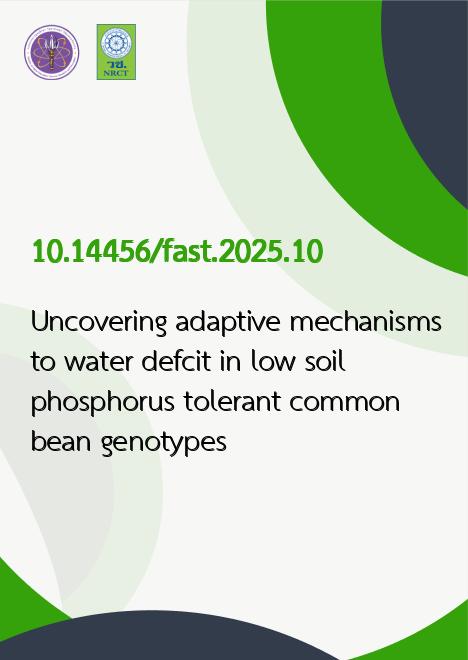
|
Uncovering adaptive mechanisms to water defcit in low soil phosphorus tolerant common bean genotypes |
|---|---|
| รหัสดีโอไอ | |
| Creator | Margaret Namugwanya |
| Title | Uncovering adaptive mechanisms to water defcit in low soil phosphorus tolerant common bean genotypes |
| Contributor | Godfrey Taulya, Twaha Ali Basamba, John Stephen Tenwya |
| Publisher | Mahasarakham University |
| Publication Year | 2568 |
| Journal Title | Food Agricultural Sciences and Technology (FAST) |
| Journal Vol. | 11 |
| Journal No. | 2 |
| Page no. | 109-129 |
| Keyword | Phaseolus vulgaris L., relative water content, specific leaf area, net assimilation rate, Uganda |
| URL Website | https://ph02.tci-thaijo.org/index.php/stej/index |
| Website title | Food Agricultural Sciences and Technology (FAST) |
| ISSN | 2822-1001 (Print), 2822-101X (Online) |
| Abstract | Water-deficit and low soil phosphorus are major constraints for common bean cultivation in sub-Saharan Africa. Tolerant varieties offer cost-effective alternatives to irrigation and fertilizers. This study examines how low phosphorus-tolerant common bean genotypes adapt to water-deficit through leaf morphology, physiology, and root development in screenhouse and field conditions. AFR703-1, AFR708, and K131 were completely randomized across well-watered and water-deficit conditions in screenhouse, with phosphorus applied at rates of 0, 6, and 16 mg P kg?¹ soil. In the field, same genotypes received triple superphosphate at rates of 0, 12, and 32 kg P ha?¹ in Mukono (well-watered) and Nakasongola (water-deficit) environments. AFR708 showed a significant (P < 0.001) 26% reduction in RWC under water-deficit without P, mitigated by higher P levels, while AFR703-1 and K131 showed no significant (p>0.05) difference under similar conditions. AFR703-1 and K131 exhibited significantly (P < 0.05) lower specific leaf area in water-deficit than well-watered conditions, contrasting with AFR708. Similarly, LMR in the studied genotypes significantly (P < 0.001) decreased with rising P under water-deficit, with diverse trends in well-watered conditions. AFR703-1 and K131 recorded higher NAR in water-deficit than well-watered conditions, contrary to AFR708. AFR genotypes significantly (P < 0.001) showed enhanced root development in water-deficit, including increased adventitious, tap, and lateral roots, higher total biomass, and finer root length compared to well-watered conditions, despite lower grain yields, notably in Nakasongola site. Over all, AFR703-1 holds promise as a breeding parent for enhancing water-deficit resilience and phosphorus tolerance in common bean production, despite yield reduction under stress.Top of Form |